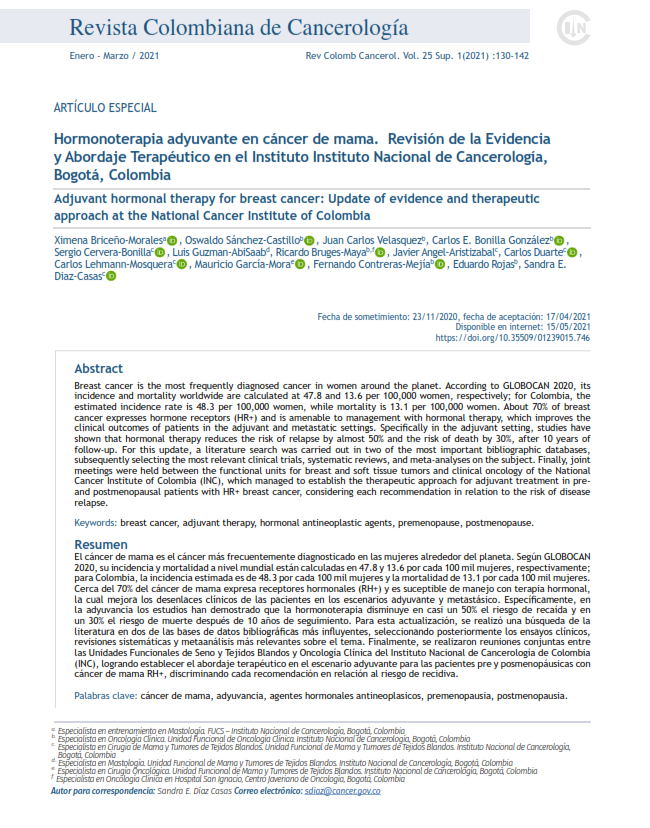Hormonoterapia adyuvante en cáncer de mama. Revisión de la Evidencia y Abordaje Terapéutico en el Instituto Instituto Nacional de Cancerología, Bogotá, Colombia
DOI:
https://doi.org/10.35509/01239015.746Palabras clave:
cáncer de mama, adyuvancia, agentes hormonales antineoplasicos, premenopausia, postmenopausiaResumen
El cáncer de mama es el cáncer más frecuentemente diagnosticado en las mujeres alrededor del planeta. Según GLOBOCAN 2020, su incidencia y mortalidad a nivel mundial están calculadas en 47.8 y 13.6 por cada 100 mil mujeres, respectivamente; para Colombia, la incidencia estimada es de 48.3 por cada 100 mil mujeres y la mortalidad de 13.1 por cada 100 mil mujeres. Cerca del 70% del cáncer de mama expresa receptores hormonales (RH+) y es suceptible de manejo con terapia hormonal, la cual mejora los desenlaces clínicos de las pacientes en los escenarios adyuvante y metastásico. Específicamente, en la adyuvancia los estudios han demostrado que la hormonoterapia disminuye en casi un 50% el riesgo de recaída y en un 30% el riesgo de muerte después de 10 años de seguimiento. Para esta actualización, se realizó una búsqueda de la literatura en dos de las bases de datos bibliográficas más influyentes, seleccionando posteriormente los ensayos clínicos, revisiones sistemáticas y metaanálisis más relevantes sobre el tema. Finalmente, se realizaron reuniones conjuntas entre las Unidades Funcionales de Seno y Tejidos Blandos y Oncología Clínica del Instituto Nacional de Cancerología de Colombia (INC), logrando establecer el abordaje terapéutico en el escenario adyuvante para las pacientes pre y posmenopáusicas con cáncer de mama RH+, discriminando cada recomendación en relación al riesgo de recidiva.
Referencias bibliográficas
Waks AG, Winer EP. Breast Cancer Treatment: A Review. JAMA. 2019 Jan 22;321(3):288-300. doi: 10.1001/jama.2018.19323.PMID: 30667505. https://doi.org/10.1001/jama.2018.19323
Guía de Práctica Clínica (GPC) para la detección temprana, tratamiento integral, seguimiento y rehabilitación de pacientes con cáncer de mama. Sistema de Seguridad Social, Colombia, 2013. Guía No. 19.
Pan H, Gray R, Braybrooke J, et al. 20-Year Risks of BreastCancer Recurrence after Stopping Endocrine Therapy at 5 Years. N Engl J Med 2017; 377:1836-1846. https://doi.org/10.1056/NEJMoa1701830
Goldvaser H, Barnes TA, Šeruga B, et al. Toxicity of Extended Adjuvant Therapy With Aromatase Inhibitors in Early Breast Cancer: A Systematic Review and Meta-analysis. JNCI: Journal of the National Cancer Institute, Volume 110, Issue 1, January 2018, Pages 31–39. https://doi.org/10.1093/jnci/djx141
Early Breast Cancer Trialists’ Collaborative Group (EBCTCG). Tamoxifen for early breast cancer: an overview of the randomised trials. Lancet 1998; 351: 1451–67.
Early Breast Cancer Trialists’ Collaborative Group (EBCTCG). Relevance of breast cancer hormone receptors and other factors to the efficacy of adjuvant tamoxifen: patient-level meta-analysis of randomised trials. Lancet 2011; 378: 771–84. https://doi.org/10.1016/S0140-6736(11)60993-8
Davies C, Pan H, Godwin J, et al. Long-term effects of continuing adjuvant tamoxifen to 10 years versus stopping at 5 years after diagnosis of oestrogen receptor-positive breast cancer: ATLAS, a randomised trial. Lancet 2013; 381: 805–16. https://doi.org/10.1016/S0140-6736(12)61963-1
Gray R, Rea D, Handley K, et al. aTTom: long-term effects of continuing adjuvant tamoxifen to 10 years versus stopping at 5 years in 6934 women with early breast cancer. J Clin Oncol 2013; 31 (suppl): abstr 5.
M P.A. Francis, O. Pagani, G.F. Fleming, B.A, et al. Tailoring Adjuvant Endocrine Therapy for Premenopausal Breast Cancer. N Engl J Med; June 4, 2018, at NEJM.org. https://doi.org/10.1056/NEJMoa1803164
Early Breast Cancer Trialists’ Collaborative Group (EBCTCG). Aromatase inhibitors versus tamoxifen in early breast cancer: patient-level meta-analysis of the randomised trials. Lancet 2015; 386: 1341–52. https://doi.org/10.1016/S01406736(15)61074-1
Benson J, Jatoi I. Extended endocrine therapy in early breast cancer: how long and who for?. Future Oncol. (2019) 16(1), 4327–4336. https://doi.org/10.2217/fon-2019-0254
Goss F, Ingle J, Martino S et al. Randomized trial of letrozole in post-menopausal women after 5 years of tamoxifen therapy for early stage breast cancer. N. Eng. J. Med. 349, 1793–1802 (2003). https://doi.org/10.1056/NEJMoa032312
Goss P, Mamounas E, Jakesz R et al. Aromatase inhibitors versus not (placebo/observation) as late extended adjuvant therapy for postmenopausal women with early stage breast cancer: overviews of randomized trials of aromatase inhibitors after approximately 5 years of tamoxifen. Cancer Res. 69, 4081 (2009).
Goss PE, Ingle JN, Pritchard KI et al. Extending aromatase inhibitor adjuvant therapy to 10 years. N Engl J Med 375, 209–219 (2016). https://doi.org/ 10.1056/NEJMoa1604700
Jakesz R, Greil R, Gnant M, et al. Extended Adjuvant Therapy With Anastrozole Among Postmenopausal Breast Cancer Patients: Results From the Randomized Austrian Breast and Colorectal Cancer Study Group Trial 6a. J Natl Cancer Inst 2007;99:1845–53. https://doi.org/10.1093/jnci/djm246.
Mamounas E, Jeong JH, Wickerham DL. Benefit From Exemestane As Extended Adjuvant Therapy After 5 Years of Adjuvant Tamoxifen: Intention-to-Treat Analysis of the National Surgical Adjuvant Breast and Bowel Project B-33 Trial. J Clin Oncol 2008, 26:1965-1971. https://doi.org/10.1200/JCO.2007.14.0228.
Blok E, Kroep JR, Meershoek-Klein Kranenbarg E et al. Optimal duration of extended adjuvant endocrine therapy for early breast cancer: results of the IDEAL trial (BOOG 2006-05). J. Natl Cancer Inst. 110 (1) https://doi.org/10.1093/jnci/djx134
Tjan-Heijnen VCG, van Hellemond IEG, Peer PGM et al. Extended adjuvant aromatase inhibition after sequential endocrine therapy (DATA): a randomized Phase III trial. Lancet Oncol. 18(11), 1502–1511 (2017). https://doi.org/10.1016/ S1470-2045(17)30600-9
Mamounas E, Bandos H, Lembersky B et al. Use of letrozole after aromatase inhibitor-based therapy in post-menopausal breast cancer (NRG Oncology/NSABP B-42): a randomized, double blind placebo-controlled, Phase III trial. Lancet 20(1), 88–99 (2019). https://doi.org/10.1016/S1470-2045(18)30621-1
Gnant M, Steger G, Greil R et al. A prospective randomized multicentre Phase-III trial of additional 2 versus additional 5 years of anastrozole after initial 5 years of adjuvant endocrine therapy – results from 3,484 post-menopausal women in the ABSCSG-16 trial. San Antonio Breast Cancer Symposium, San Antonio, TX, USA, 7 December 2017.
Ohtani S, Iijima K, Higaki K et al. A prospective randomized multicenter open-label Phase III trial of extending aromatase inhibitor therapy to 10 years: results from 1,697 postmenopausal women in the N-SA BC05 trial: arimidex extended adjuvant randomized study (AERAS). San Antonio Breast Cancer Symposium San Antonio, TX, USA, 4–8 December 2018.
Del Mastro L, Mansutti M, Bisagni G, Ponzone R, Durando A, Amadducci L. Benefit from letrozole as extended adjuvant therapy after sequential endocrine therapy: a randomized Phase III study of Gruppo Italiano Mammella (GIM). J. Clin. Oncol. 37(Suppl. 1), Abstr 504 (2019).
Duffy SW, Vulkan D, Cuckle H, et al. Extended adjuvant intermittent letrozole versus continuous letrozole in postmenopausal women with breast cancer (SOLE): a multicentre, open-label, randomised, phase 3 trial. www.thelancet.com/oncology Published on line, November 17, 2017. https://doi.org/10.1016/S1470-2045(17)30715-5
Finn RS, Martin M, Rugo HS, Jones S, Im SA, Gelmon K, et al. Palbociclib and letrozole in advanced breast cancer. N Engl J Med. 2016;375(20):1925–36. https://doi.org/10.1056/NEJMoa1607303
Hortobagyi GN, Stemmer SM, Burris HA, Yap YS, Sonke GS, PaluchShimon S, et al. Ribociclib as first-line therapy for HR-positive, advanced breast cancer. N Engl J Med. 2016;375(18):1738–48. https://doi.org/10.1056/NEJMoa1609709
Goetz MP, Toi M, Campone M, Trédan O, Bourayou N, Sohn J, et al. MONARCH 3: Abemaciclib as initial therapy for advanced breast cancer. J Clin Oncol. 2017;35(32):3638–46. https://doi.org/10.1200/JCO.2017.75.6155
Tripathy D, Im SA, Colleoni M, Franke F, Bardia A, Harbeck N, et al. Ribociclib plus endocrine therapy for premenopausal women with hormone-receptor-positive, advanced breast cancer (MONALEESA-7): a randomised phase 3 trial. Lancet Oncol [Internet]. 2018;19(7):904–15. Available from: http://dx.doi.org/10.1016/S1470-2045(18)30292-4.
Im SA, Lu YS, Bardia A, Harbeck N, Colleoni M, Franke F, et al. Overall survival with ribociclib plus endocrine therapy in breast cancer. N Engl J Med. 2019;381(4):307–16. https://doi.org/10.1056/NEJMoa1903765
Turner NC, Slamon DJ, Ro J, Bondarenko I, Im SA, Masuda N, et al. Overall survival with palbociclib and fulvestrant in advanced breast cancer. N Engl J Med. 2018;379(20):1926–36. https://doi.org/10.1056/NEJMoa1810527
Slamon DJ, Neven P, Chia S, Fasching PA, De Laurentiis M, Im SA, et al. Overall survival with ribociclib plus fulvestrant in advanced breast cancer. N Engl J Med. 2020;382(6):514–24.
https://doi.org/10.1056/NEJMoa1911149
Sledge GW, Toi M, Neven P, Sohn J, Inoue K, Pivot X, et al. The Effect of Abemaciclib Plus Fulvestrant on Overall Survival in Hormone Receptor-Positive, ERBB2-Negative Breast Cancer That Progressed on Endocrine Therapy - MONARCH 2: A Randomized Clinical Trial. JAMA Oncol. 2020;6(1):116–24. https://doi.org/10.1001/jamaoncol.2019.4782
Johnston Stephen R. D, Harbeck Nadia, Hegg T Roberto, et al. Abemaciclib Combined With Endocrine Therapy for the Adjuvant Treatment of HR+, HER2-, Node-Positive, High-Risk, Early Breast Cancer (monarchE). scopubs.org/journal/ jco on September 20, 2020: DOI https://doi. org/10.1200/JCO.20. 02514. https://doi.org/10.1200/JCO.20.02514
Mayer EL, Gnant MI, DeMichele A, et al. PALLAS: A randomized phase trial of adjuvant palbociclb with endocrine therapy vs andocrine therapy alone for HR+/HER2 early breast cancer. ESMO Virtual Congress 2020. Abstract LBA 12. Presented September 20, 2020.
Slamon DJ, et al. NATALEE: Phase III study of ribociclib (RIBO) + endocrine therapy (ET) as adjuvant treatment in hormone receptor–positive (HR+), human epidermal growth factor receptor 2–negative (HER2–) early breast cancer (EBC). May 2019. Journal of Clinical Oncology 37(15_suppl):TPS597TPS597. DOI:10.1200/JCO.2019.37.15_suppl.TPS597.
Von Minckwitz G, et at. Abstract OT2-6-11: PENELOPE: Phase III study evaluating palbociclib (PD-0332991), a cyclin-dependent kinase (CDK) 4/6 inhibitor in patients with hormone-receptorpositive, HER2-normal primary breast cancer with high relapse risk after neoadjuvant chemotherapy (GBG-78/BIG1-13). Cancer Res 2013;73(24 Suppl): Abstract nr OT2-6-11.
Díaz-Casas SE, Castilla-Tarra JA, Pena-Torres E, et al. Pathological Response to Neoadjuvant Chemotherapy and the Molecular Classification of Locally Advanced Breast Cancer in a Latin American Cohort. The Oncologist 2019;24:1–11. https://doi.org/10.1634/theoncologist.2019-0300
Cómo citar
Descargas

Descargas
Publicado
Número
Sección
Licencia
Todos los derechos reservados.




